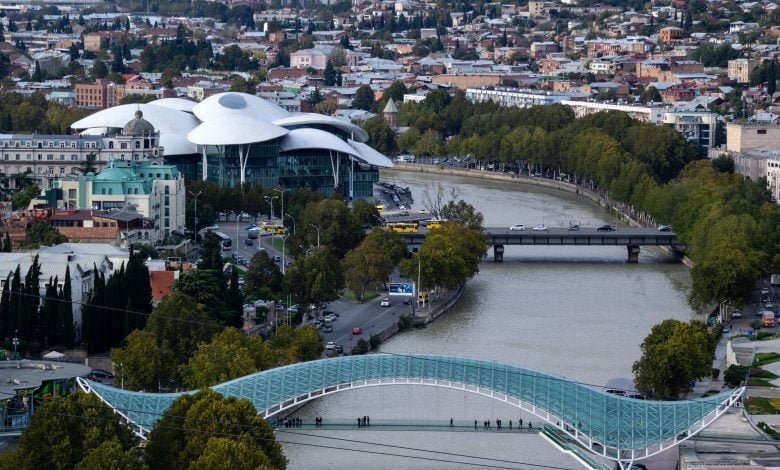
IRI Poll Shows Pessimism Among Population
A new public opinion poll, commissioned by the International Republican Institute (IRI) and released on 7 November, reveals that much of the Georgian public believes the country is heading in the wrong direction, is concerned with the state of the economy, and is skeptical about Georgia receiving EU candidate status in 2023.
Reckoning the country’s direction, 62% of the respondents said Georgia is going in the wrong direction (up from 61% in March 2022), while 30% said it goes in the right direction (down from March).
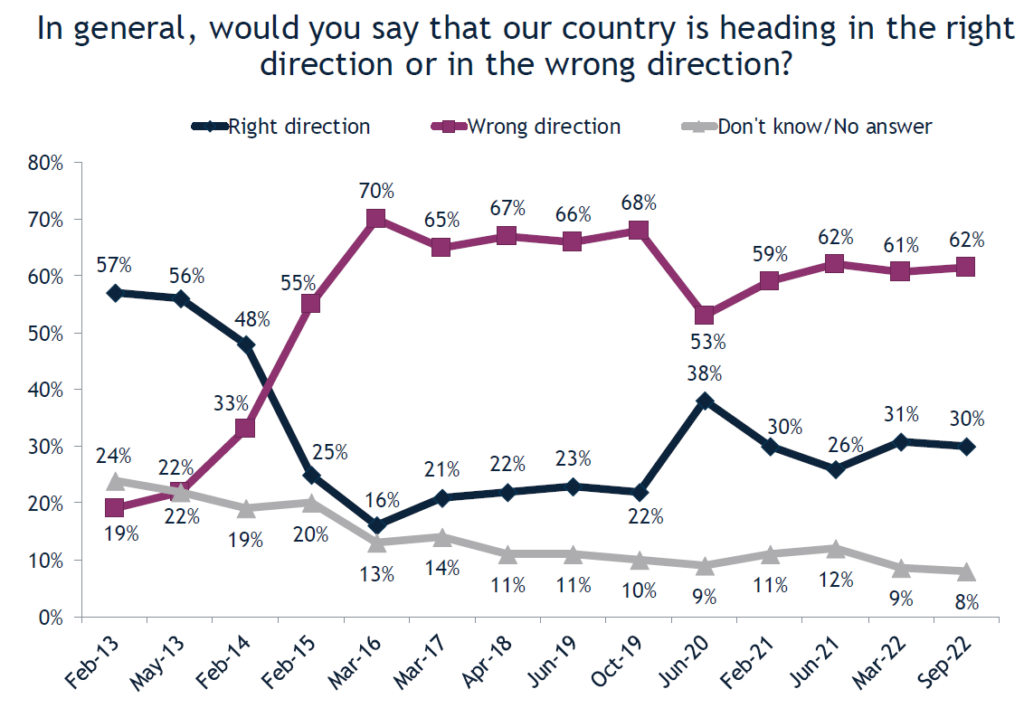
EU Candidate Status
Asked about whether Georgia is likely to receive EU candidate status in 2023, 26% said it was very unlikely, while 24% stated it was somewhat unlikely, 27% said it was somewhat likely, and only 10% said that it was very likely.
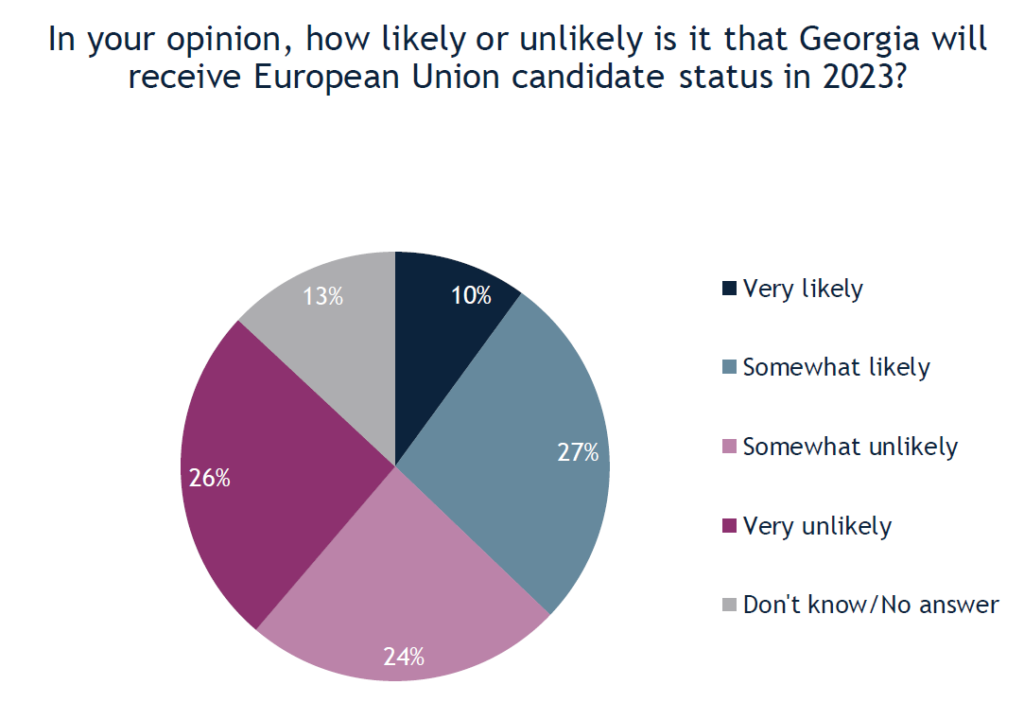
Notably, the majority of Georgians are in agreement on the government/Georgian Dream holding much of the responsibility for whether the country is granted candidacy or not, with 51% saying they will be responsible if Georgia is successful and 64% holding them culpable if Georgia is unsuccessful.
Regarding the biggest obstacle to Georgian joining the EU, 30% named political instability, 17% stated internal opposition, 15% – opposition by EU countries, and 14% – that Georgia has not met its obligations under the EU Association Agreement.
Significantly, when asked if they had heard about the European Commission’s 12 recommendations, 36% said they had not, while 24% said they had but did not know what they are about, and only 37% stated that they had heard of them and know what they are about.
Trust Towards Political Parties
72% of respondents stated that they would like to see new political parties in future elections, while only 22% stated that they were satisfied with the current choices. At the same time, when asked if respondents trusted Georgia’s political parties, 35% stated that they distrust political parties. In comparison, 49% said they neither trust nor distrust parties and only 15% stated that they trust parties.
Notably, when asked if respondents believe that at least one political party in Georgia represented their interests, 42% said that none of the parties represent their interests, while 32% said that there was at least one party that more or less represents their interests, and only 24% said that there is at least one party which fully represents their interests.
Finally, asked if they agree with the following statement “it is healthy for Georgia’s democracy to have multiple parties in power,” 48% strongly agreed, and 26% somewhat agreed. 9% and 12%, respectively, disagreed somewhat and strongly disagreed.
Party Ratings
Questioned on who they would vote for if Parliamentary elections were held this coming Sunday, 25% named Georgian Dream, 12% selected the United National Movement, 3% went for the For Georgia party, and another 3% for the Girchi – More Freedom. 2-2% each to Strategy Aghmashenebeli, Droa, the Labor Party, For the People, Girchi, and the Patriot’s Alliance. While 1-1% went to Lelo and Citizens’.
At the same time, 33% said they would not vote for the UNM party under any circumstances, while 30% said the same for the Georgian Dream. 18% had the same reaction to the Patriot’s Alliance, 15% to the Conservative Movement, 14% to European Georgia, and 12% to Girchi – More Freedom.
Significantly, in relation to the opposition’s demands for snap parliamentary elections, 34% fully supported the initiative, 18% somewhat supported it, 8% somewhat opposed it, 34% definitely opposed it, and 6% did not know/did not answer.
Public Figures, Institutions
Georgian Orthodox Church Patriarch Ilia ll retained his place as the most favorably viewed public figure, with 88% favorability, Tbilisi Mayor Kakha Kaladze followed second with 51%. 44% of the respondents viewed Prime Minister Irakli Garibashvili favorably, 40% – Anna Dolidze, leader of the For People party, and 38% – President Salome Zurabishvili.
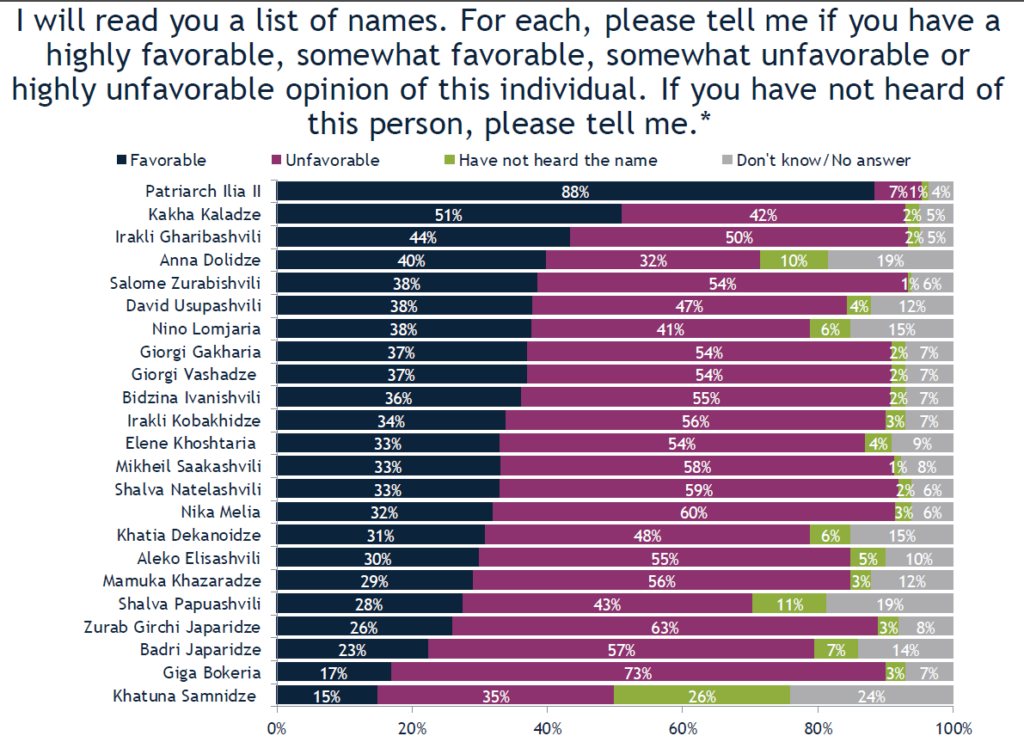
Meanwhile, the most unfavorably viewed politicians are Giga Bokeria (73%), Zurab Girchi Japaridze (63%), and Nika Melia (60%).
Army and the Church top the list as most favorably viewed institutions with 74% and 68%. Georgian police, local authorities, and media follow with 63%, 59%, and 55%, respectively.
The two most unfavorably viewed institutions were considered to be political parties (60%) and the Georgian Parliament (56%), while the Central Election Commission and the President’s Office were tied for third place with 53% each.
Economic Issues Persist
Asked about the most important problem facing Georgia today, 41% and 18% of the interviewees answered unemployment and cost of living, respectively, while 7% said poverty as their first mentions (the respondents could make two mentions).
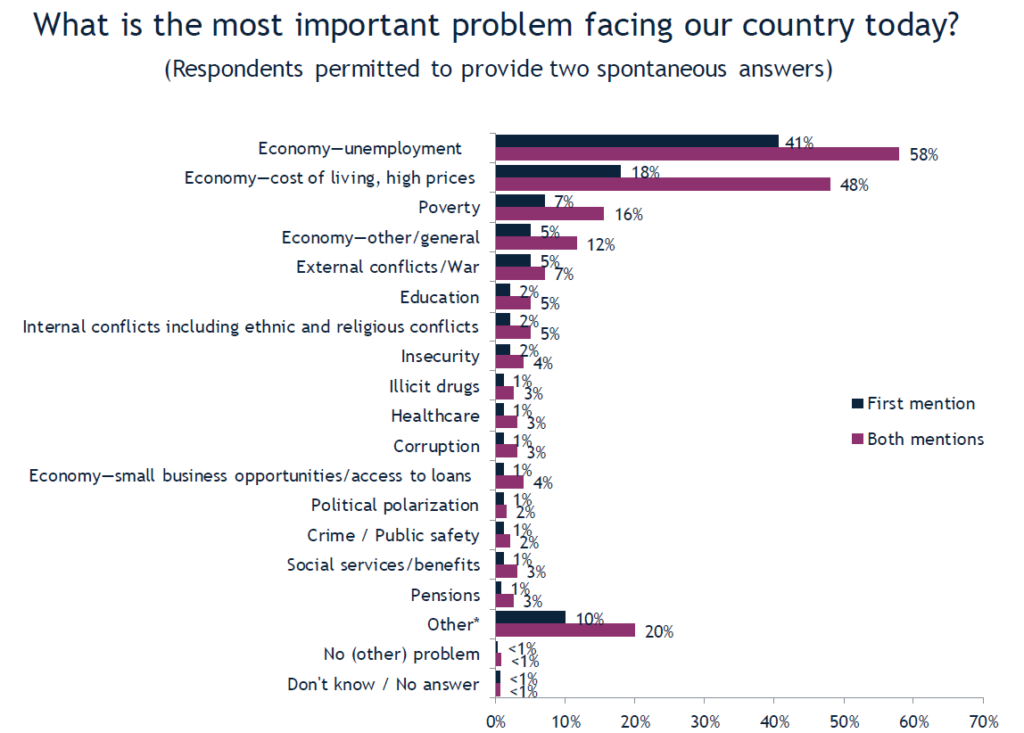
Furthermore, regarding how the economic situation has changed in the last 12 months, 30% stated that it has worsened a lot, while a further 31% said it has worsened somewhat, and 26% said it stayed the same, while only 12% said it had improved somewhat and 1% said that it had improved a lot.
Similarly, 35% stated that the economic situation of their household was somewhat bad, 16% stated that it was very bad, and 48% stated that it was somewhat good.
International Relations
Allowed multiple responses, 51% stated that the EU is Georgia’s most important political partner, while 47% named the U.S., 24% – Ukraine, 16% – Turkey, and 14% – Azerbaijan. Similarly, regarding Georgia’s most important economic partners, 48% named the EU, while 43% said it was the U.S., 28% – Turkey, 19% – Ukraine, and 18% – Azerbaijan.
89% of Georgians considered Russia to pose the greatest political threat to the country, while 80% said it poses the greatest economic threat. 34% fully and 25% somewhat support further dialogue with the country. 50% rated the GD government’s handling of relations with Russia negatively, while 42% rated it positively.
Attitude Towards Russians
Regarding Russian citizens’ rights in Georgia, 78% said that they did not support Russians being able to enter Georgia without a visa, register a business, or purchase property.
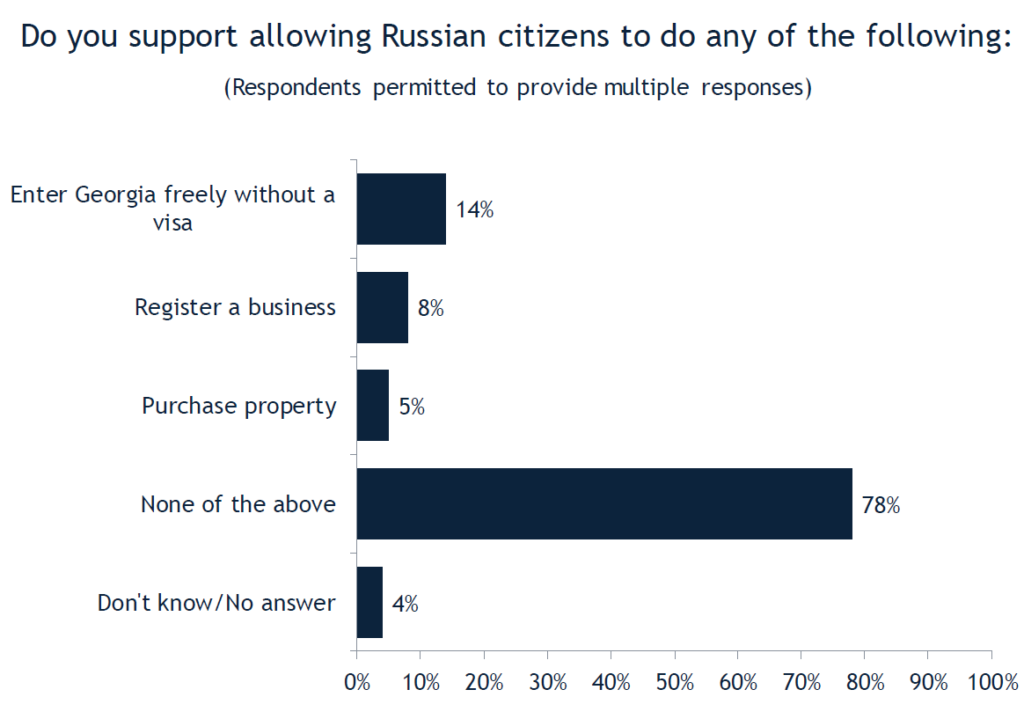
When it comes to Russian tourists, 38% stated that Russians should not be allowed in Georgia until they return Georgia’s occupied regions, while 17% expressed a preference that Russian tourists leave the country, and 26% expressed tolerance towards Russians on the basis that they are “essential” to the economy. Only 13% stated that Russian tourists are “very much welcome in Georgia.”
Information Sources
31% of the respondents named Imedi TV, a pro-Georgian Dream government station, as the most trusted television station, 14% said Mtavari Arkhi TV, critical to the GD government, 10% said TV Pirveli, 8% said Rustavi 2, and 3% said the Georgian Public Broadcaster.
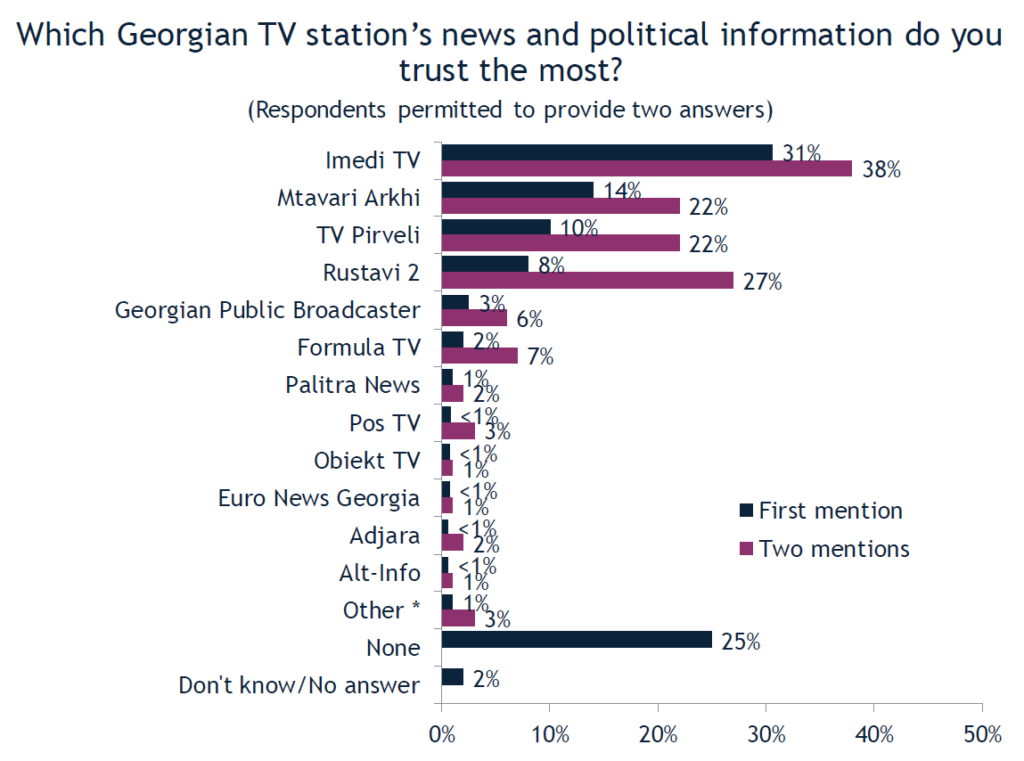
Also Read:
This post is also available in: ქართული Русский